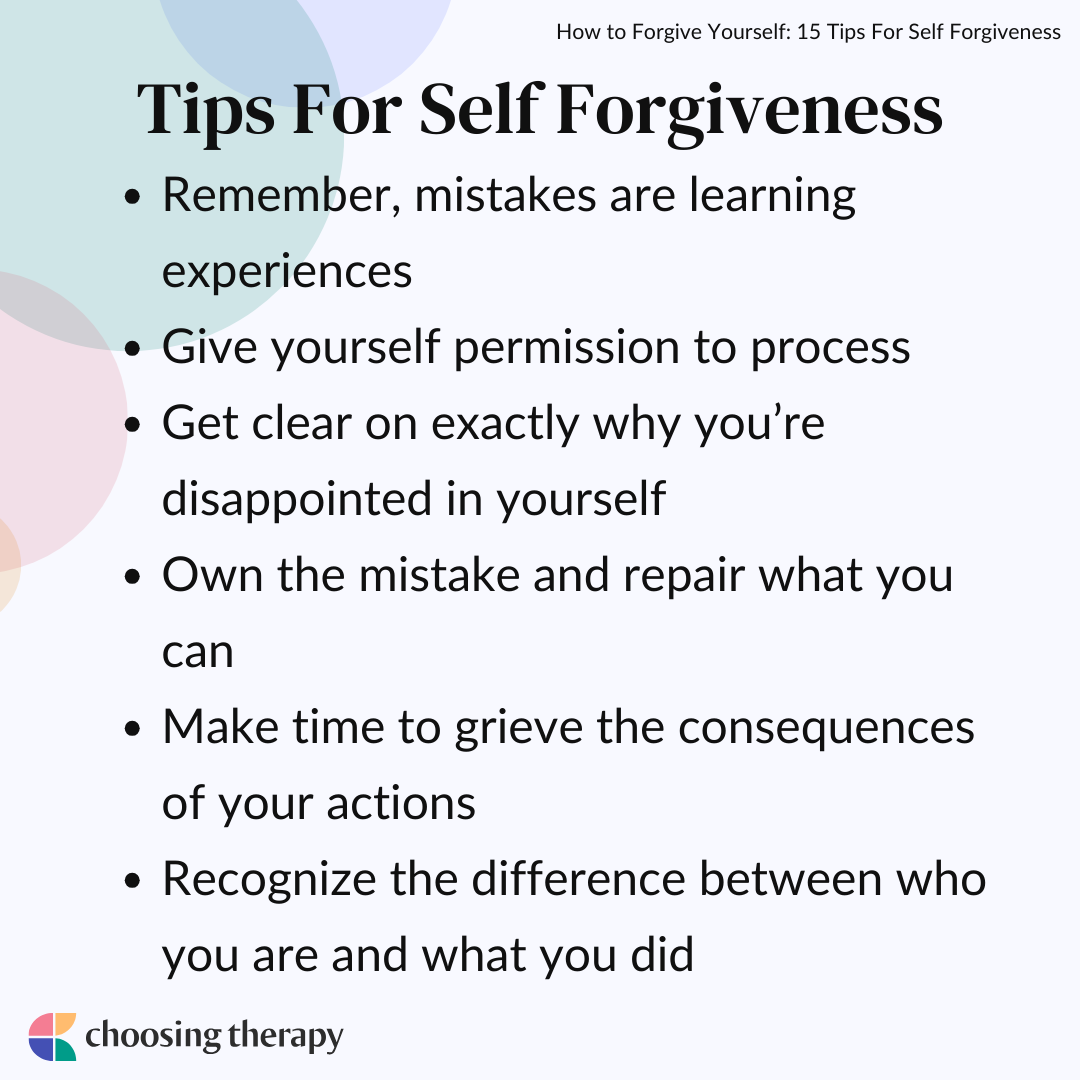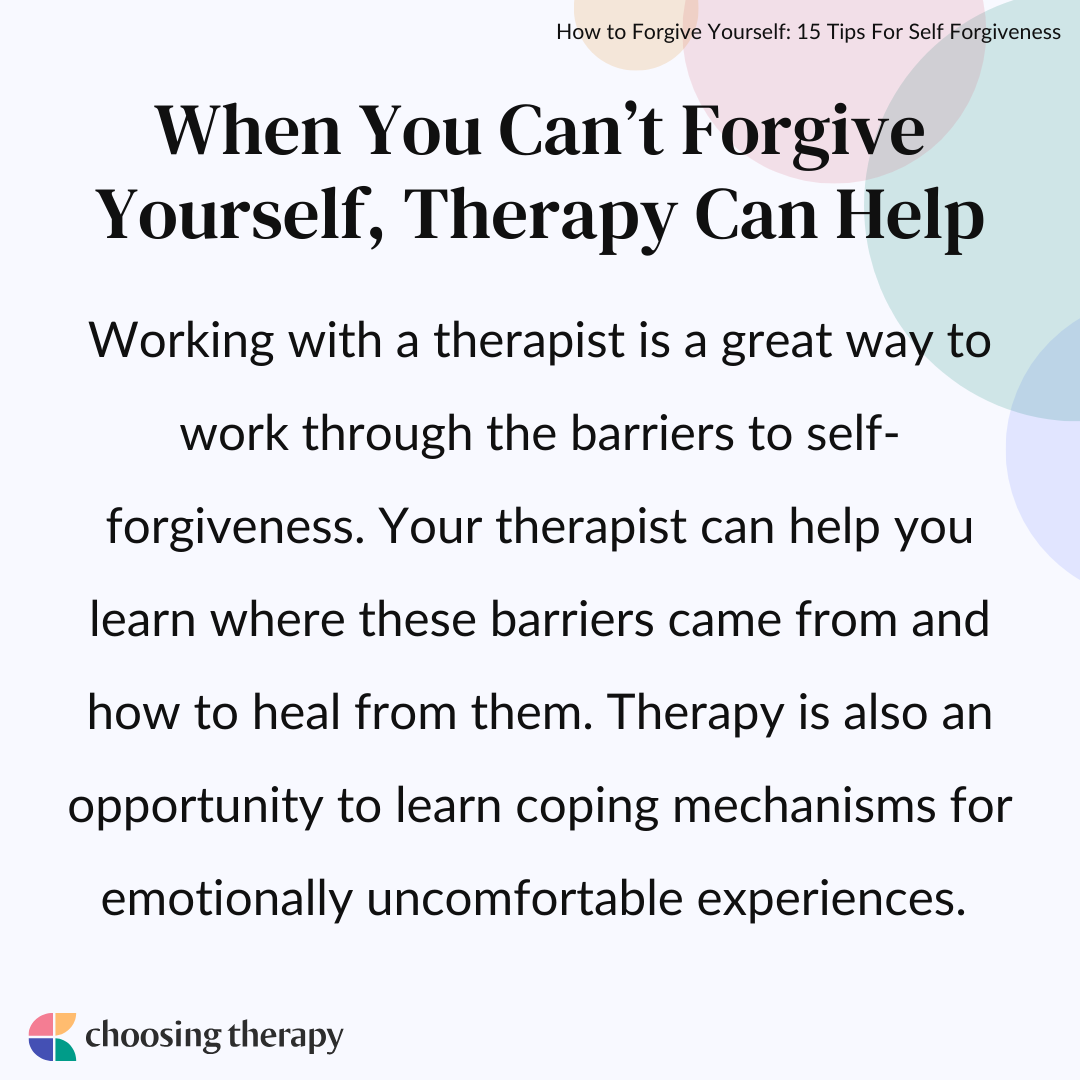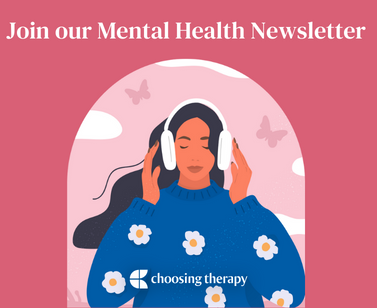Learning how to forgive yourself is difficult. It takes time, effort, and patience to make peace with your mistakes and move on. As adults, we’re more likely to forgive others, but we need to remember to practice the same kind of empathy for ourselves. Regardless of the scale of your mistake, it’s important you allow yourself to go through all the motions and feel all your feelings.
Self forgiveness simply means that you have accepted the mistake and the outcome of the mistake and are willing to work to move past it and stop feeling guilty. It means you won’t ruminate on the mistake, allowing yourself the humility to accept that you are a human being who is imperfect. Forgiveness doesn’t equate to condoning a specific behavior, nor should one think that they can act a certain way and ask for forgiveness later. Forgiveness comes with a certain amount of self-awareness, allowing the person to feel deeply sorry and reflect that in their behavior.1
Working with a therapist can lead to quicker progress. BetterHelp has over 20,000 licensed therapists who provide convenient and affordable online therapy. BetterHelp starts at $65 per week. Take a Free Online Assessment and get matched with the right therapist for you.
Why Is Self Forgiveness Important?
Holding onto regret or ruminating about the past takes a huge toll on your life and your mental health. It is important to forgive yourself so you can stop dwelling on the past, move forward, and focus on everything that the present moment has to offer. Self forgiveness allows you to focus on goals for the future, make positive changes and improve your confidence and self-esteem.
Here are some reasons why you should forgive yourself:
- You are worthy of love and support: Self forgiveness opens the door for connecting with others and allowing yourself to be supported. All human beings need connection, love, and support.
- You’ll have a hard time showing others compassion if you don’t have any for yourself: How can you extend forgiveness, kindness, and compassion to others if you can’t give it to yourself? Start with yourself first, and offer yourself the same understanding as you would a friend. You may still not be happy with the circumstances, but you can choose to show compassion to yourself and others.
- You’ll rob yourself of present joy if you live in unforgiveness: Not forgiving yourself keeps you focused on the past. There’s nothing you can do to change the past—you can’t go back. You can, however, make a decision to forgive yourself and move forward, starting today. This opens you up to experience the joy that is happening in the present moment.
1. Remember, Mistakes Are Learning Experiences
Mistakes can be a good way to learn about yourself and take the outcome as an opportunity to reflect. It’s important that we take risks in life; sometimes, that means taking the hits with an eager-to-learn heart.
2. Give Yourself Permission to Process
It’s important that you give yourself permission to process the mistake and learn to deal with it in a healthy way. Sometimes, that means taking a step away from it. Give yourself permission to step away without guilt or feeling like you’re running away from your problems. We all need a minute to regroup.
3. Get Clear on Exactly Why You’re Disappointed in Yourself
While it’s not helpful to ruminate or obsess about the past, it can be helpful to examine the reasons why something felt so bad. Take a look at your values, the things that are the most important to you in life: Does whatever you are having a hard time forgiving yourself for clash with those values? It is often the case that, when people feel bad about something, it is because it doesn’t align with who they want to be.
For example, imagine if one of your most important values was kindness. In a moment of stress, you said or did something very unkind that hurt someone’s feelings. This doesn’t feel good because it isn’t aligned with what is most important to you. Start by getting clear on what that value disconnect is. Then, you can start taking steps to make amends and avoid betraying your values as much as possible in the future.
4. Own the Mistake & Repair What You Can
There is nothing quite like owning up to your mistakes. By owning your mistakes, you are taking power back from the mishap and can redirect that energy into making it better. If the mistake has affected another person, perhaps a sincere apology can help mend what was said or done, and help alleviate some of the pressure you’re putting on yourself.
5. Make Time to Grieve the Consequences of Your Actions
While it is important to forgive yourself and move forward, there may be real consequences or damage done by your actions. This might include harm to others or the loss of a friend, relationship, or job. It’s important to allow yourself to grieve those losses.
6. Recognize the Difference Between Who You Are & What You Did
The things that you do are not who you are. Thoughts and behaviors are different from your identity and the person you are inside. So remember that even if you did something that feels bad, it doesn’t mean you are a bad person. You are simply a human being who made a mistake.
7. Challenge Your Negative Self-Talk
It’s easy to beat yourself up when you’re already feeling down, but take time to challenge your inner monologue. What if you spoke to yourself with compassion: What would your inner monologue say back? How would you feel? Would you handle the aftermath of the mistake any differently? Consider all of these questions.
8. Talk to Yourself Like You’d Talk to a Friend
When you’re trying to forgive yourself but have doubts about whether you deserve to be forgiven, call yourself out the way you’d call out a friend who was doubting themselves. It’s important that you remain your biggest supporter, advocate, and fan.
Top Rated Online Therapy Services BetterHelp – Best Overall “BetterHelp is an online therapy platform that quickly connects you with a licensed counselor or therapist and earned 4 out of 5 stars.” Visit BetterHelp Online-Therapy.com – Great Alternative In addition to therapy, all Online-Therapy subscriptions include a self-guided CBT course. Visit Online-Therapy.com
9. Taste Your Own Medicine
Do you have friends who give great advice but rarely listen to it? You’ve probably done the exact same thing. Take a minute to consider some of your own sage advice about moving on from a mistake.
10. Turn Off the Negative Thoughts
Don’t stay in one place and perseverate on the mistake. Replaying it over and over again doesn’t do anyone any good. When the mistake is over, reflect, but don’t unpack and stay in the feelings of shame and guilt.
11. Feel All Your Feelings
Make sure you allow yourself to feel the depth of all your emotions without feeling like you’re teetering on toxic positivity. Be real with yourself, let all your feelings out, grieve, and give yourself permission to move on.
12. List & Reflect On Your Values
When you feel guilty and are having a hard time forgiving yourself for something, it is likely that your actions were out of alignment with your values. Take some time to reflect on what is important to you and identify what your values are, then take steps to live in a way that fits with those values. You can use a values sheet to keep track of which values feel most important to you.
13. Distract Yourself When You Need To
While distraction isn’t the best long-term strategy, there are times when it can be helpful. If you find that you are obsessing about something that happened in the past, or you can’t stop having negative thoughts about what happened, a distraction may be just the thing you need to stop the thoughts. Try reading, writing, going for a walk, an exercise class, watching a TV show, or playing a video game.
14. Journal About the New Direction You’re Going to Take
Once you’ve reflected on what you can change, taken steps to repair the situation and reflected on your values, it’s time to put all of that hard work into action. Make a list of action steps that you can take to move you toward your goals.
15. Talk to a Therapist
It can help to talk to a therapist and identify what holds you back from forgiving yourself. Not only will this help you in the present moment, but you may also learn techniques for the future.2
The Benefits of Forgiving Yourself
Forgiving yourself can feel like finally putting down a huge weight you’ve been carrying around. It can improve your mental and physical health by reducing the chronic stress you’ve been under and helping you be more present in the moment. It can allow you to be more open and connected in your relationships.
Mental Health Benefits
Forgiving yourself means giving yourself permission to stop constantly replaying negative thoughts and things you’ve done wrong. It allows you to notice the positive things in life and focus on growth and progress toward your goals. Overall, it can allow you to adopt a more positive mindset which opens you up to more possibilities.
Physical Health Benefits
Not forgiving yourself can lead to a state of chronic stress, which has been proven by many studies to be damaging to physical health. In addition to GI and cardiovascular health, chronic stress has been shown to increase risks of depression, cancer, and Alzheimer’s disease. Letting go of negativity and stress by forgiving yourself can decrease this stress burden and improve your physical health.5, 6
Relational Benefits
Forgiving yourself allows you to be more open and vulnerable in your relationships. It allows you to accept and share your true self while also taking steps toward avoiding the behaviors and choices you felt bad about in the first place.
How to Forgive Yourself for the Unforgivable?
Long-term beliefs that certain mistakes are somehow unforgivable can seem impossible to work through. When we hold onto the belief that we cannot be forgiven, it saddles us with an emotional load. Feelings of shame and guilt are part of the human experience, but if you don’t forgive yourself, it only makes those feelings worse.
Shame and guilt affect us in different ways, especially when we’re already vulnerable. It’s important to understand that as humans, we all make mistakes, but those mistakes don’t define us or make us less worthy of forgiveness. If you feel like you are no longer worth forgiving, consider reaching out to a therapist.3
When You Can’t Forgive Yourself, Therapy Can Help
Working with a therapist is a great way to work through the barriers to self-forgiveness. Your therapist can help you learn where these barriers came from and how to heal from them. Therapy is also an opportunity to learn coping mechanisms for emotionally uncomfortable experiences. There are many resources you can use to help you choose a therapist, including asking your primary care provider for a referral, referencing your insurance information, or using an online therapist directory.4
Final Thoughts
Self-forgiveness can be difficult, but it is always achievable. Remember, you’re not alone; we all make mistakes. There are so many ways to work through the challenges that block the path to self-forgiveness. With time, patience, and faith in yourself, you can learn to let go and move forward.
To help our readers take the next step in their mental health journey, Choosing Therapy has partnered with leaders in mental health and wellness. Choosing Therapy is compensated for marketing by the companies included below. Online Therapy BetterHelp Get support and guidance from a licensed therapist. BetterHelp has over 20,000 therapists, who provide convenient and affordable online therapy. Complete a brief questionnaire and get matched with the right therapist for you. Get Started Psychiatry, with you in mind Talkiatry Our Psychiatrists Can Diagnose Your Condition, Prescribe Medication, And Monitor Your Progress. Most psychiatry visits cost patients $30 or less* Free Assessment Drinking Moderation Sunnyside Want to drink less? Sunnyside helps you ease into mindful drinking at your own pace. Think lifestyle change, not a fad diet. Develop new daily routines, so you maintain your new habits for life. Take a 3 Minute Quiz Relationship Help OurRelationship (Free Couples Course) OurRelationship has been proven to help couples improve communication, intimacy, and trust. 94% would recommend it to a friend. Get Started Mental Health Support Group App Circles Anytime, anonymous, and free. Never feel alone during life’s greatest challenges. Drop-in to live conversations and share thoughts, ask questions, or learn from others on the same journey. Join Circles Now Free Prescription Discount Card Optum Perks Save up to 80% on most prescriptions. Optum Perks provides discounts at over 64,000 pharmacies nationwide. No memberships or costs to you, ever. It’s really that easy. Get your card and start saving. Get the discount card! *Includes copayment, deductible, coinsurance, and $0 Visits. Excludes no shows.Additional Resources
For Further Reading
Online Anxiety Test A few questions from Talkiatry can help you understand your symptoms and give you a recommendation for what to do next. How Does ERP Help With Intrusive Thoughts? Obsessive compulsive disorder (OCD) is a psychiatric condition marked by the presence of obsessive thoughts, images, doubts, or urges, followed by compulsive behaviors or acts aimed at easing the distress caused by the obsession. While the content of the obsessions can take many forms, they are always repetitive, persistent, involuntary, and intrusive, and they often result in a great deal of anxiety for the person experiencing them.









